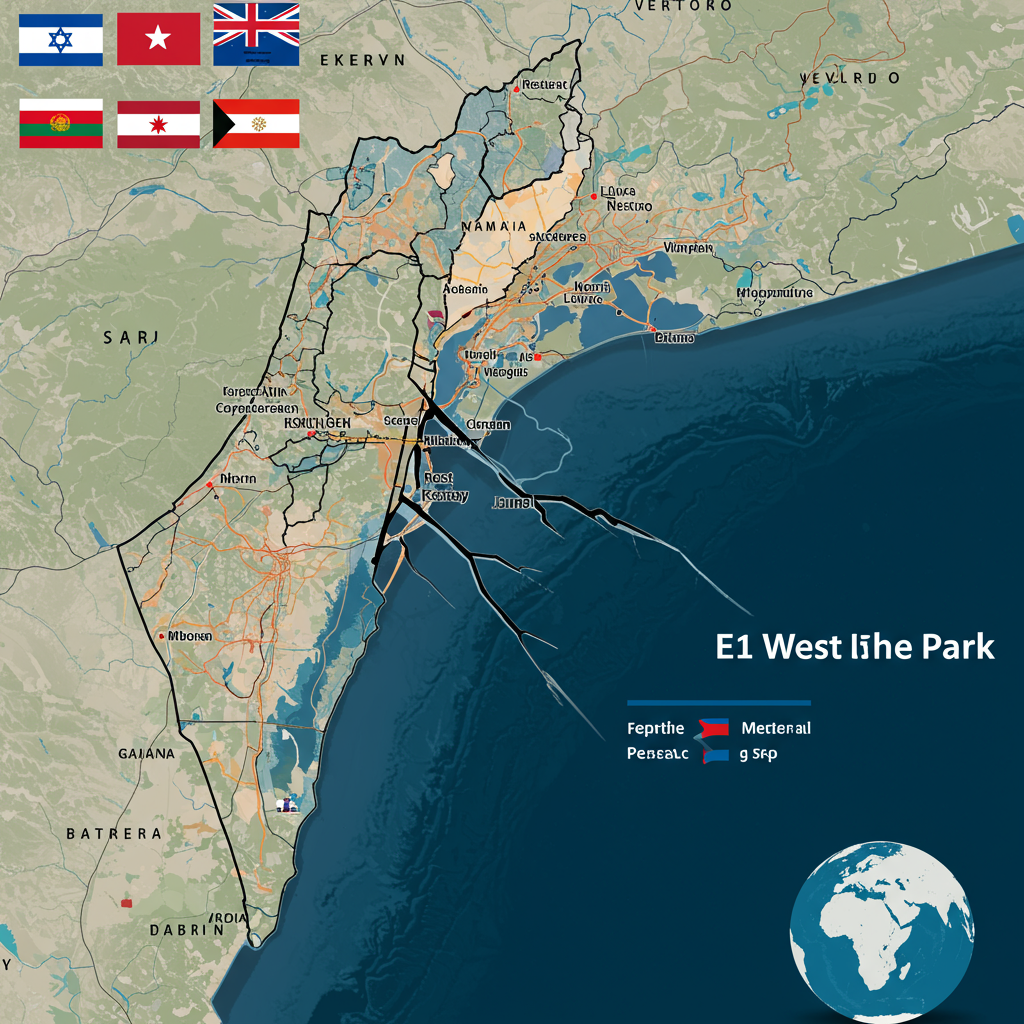The Israeli government has ignited widespread global concern by granting final approval to the contentious E1 settlement project in the occupied West Bank. This pivotal decision, unfolding amidst escalating regional tensions, threatens to fundamentally reshape the geopolitical landscape, potentially severing the West Bank and undermining the long-held vision of an independent Palestinian state. Critics argue this move is a strategic step towards irreversible fragmentation, drawing sharp condemnation from international bodies and numerous countries.
The Highly Controversial E1 Project Explained
The E1 settlement project, a development plan for approximately 3,400 to 3,500 new housing units, is located on a critical 12-square-kilometer tract of land. This sensitive area lies just east of Jerusalem, connecting the city to the large Israeli settlement of Maale Adumim. For over two decades, plans for E1 remained largely frozen, primarily due to intense pressure from previous U.S. administrations and broad international opposition. Its recent approval, overseen by the Civil Administration’s Higher Planning Council under ultranationalist Finance Minister Bezalel Smotrich, marks a significant shift in Israeli policy.
The strategic importance of the E1 area cannot be overstated. It represents one of the last remaining direct geographical links between the major Palestinian cities of Ramallah in the northern West Bank and Bethlehem in the south. Currently, travel between these two cities, which are only 22 kilometers (14 miles) apart by air, often requires lengthy detours and navigating multiple Israeli checkpoints, adding hours to journeys. Should the E1 project proceed, it would create an impenetrable barrier, forcing Palestinians into even wider detours and further fragmenting their territory into disconnected enclaves.
Decades of Deliberation, Swift Approval
The E1 plan has been under consideration for over twenty years, facing consistent international pushback. However, the current Israeli government, dominated by religious and ultranationalist politicians with strong ties to the settlement movement, has fast-tracked its approval. Finance Minister Bezalel Smotrich, a former settler leader now holding Cabinet-level authority over settlement policies, has been a vocal proponent. He has openly declared the project’s intent to “finally bury the idea of a Palestinian state,” stating that “every settlement, every neighborhood, every housing unit is another nail in the coffin of this dangerous idea.”
The planning committee rejected all petitions against the construction on August 6, paving the way for final approval on August 20, 2025. If the bureaucratic process moves swiftly, infrastructure work could commence within months, with residential construction potentially beginning within a year. This accelerated timeline underscores the Israeli government’s determination to implement the project despite widespread international alarm.
International Outcry and the Viability of a Two-State Solution
The E1 project has triggered immediate and forceful condemnation from Palestinians, human rights organizations, and a significant portion of the international community. The core of this widespread opposition stems from the consensus that Israeli settlement construction in occupied territories is illegal under international law and constitutes a major impediment to peace and the realization of a two-state solution.
The Palestinian Authority (PA) vehemently condemned the approval as a “colonial, expansionist, and racist move.” Ahmed Al-Deek, political adviser to the Palestinian Foreign Affairs Minister, warned that it is designed to “undermine any possibility of establishing a Palestinian state on the ground, to fragment the West Bank, and to separate its southern part from the center and the north.” The PA’s foreign ministry specifically stated that the plan would “isolate Jerusalem from its Palestinian surroundings, submerge it in massive settlement blocs,” creating “disconnected enclaves resembling open-air prisons.” They have called for “genuine international action, including sanctions,” to halt Israel’s “colonial schemes.”
Global Opposition to Settlement Expansion
Beyond the Palestinian Authority, numerous international actors have echoed these concerns. United Nations Secretary-General Antonio Guterres has condemned the announcement, reiterating the UN’s call for Israel to halt all settlement activity. UN spokesman Stephane Dujarric emphasized that settlements “violate international law, further entrench the occupation, fuel tensions, and systematically erode the viability of a Palestinian state as part of a two-state solution.” He cautioned that E1 construction would “severely undermine the prospects for the realization of a viable, contiguous Palestinian state.”
Leaders from the UK, Jordan, and Germany have also voiced strong opposition. British Foreign Secretary David Lammy rejected the plans, and Jordan’s King Abdullah II denounced the project while reaffirming the two-state solution as the only path to comprehensive peace. A German government spokesman expressed difficulty understanding how such actions would lead to hostage releases or a ceasefire, highlighting concern for Gaza civilians and advocating for a two-state solution.
The international community’s stance on the illegality of settlements was recently reinforced by an advisory opinion from the International Court of Justice (ICJ) in July 2024. The ICJ stated that Israel’s “continued presence in the Occupied Palestinian Territory is unlawful” and obliged Israel to end its “unlawful presence… as rapidly as possible.” While Prime Minister Netanyahu rejected this ruling, asserting that “the Jewish people are not occupiers in their own land,” the consensus among many international actors aligns with the ICJ’s position.
Contextualizing the E1 Approval: A Broader Strategy?
The approval of the E1 project occurs within a period of heightened tensions and significant shifts in the Israeli-Palestinian conflict. Global attention remains largely focused on the ongoing conflict in Gaza, which began after the October 7, 2023, Hamas attack. While the E1 project is distinct from the Gaza operations, it is seen by many critics as part of a broader Israeli strategy to advance its territorial claims under the cover of war.
Since the October 2023 events, the occupied West Bank has witnessed a marked increase in settler attacks against Palestinians, forced evictions from Palestinian towns, and intensified Israeli military operations. Concurrently, there have also been several Palestinian attacks on Israelis. The number of Israeli settlers in the West Bank and East Jerusalem has grown substantially, now exceeding 700,000. Finance Minister Smotrich has even vowed to double the existing settler population in the West Bank, aligning with the current government’s ultranationalist agenda.
Israeli anti-settlement watchdog Peace Now warned that the E1 project’s “sole aim is to sabotage a political solution and rush toward a binational apartheid state.” Aviv Tatarsky, a researcher at Israeli NGO Ir Amim, further condemned the move, asserting it demonstrates Israel’s determination to pursue a “strategic programme to bury the possibility of a Palestinian state and to effectively annex the West Bank,” describing it as a “conscious Israeli choice to implement an apartheid regime.” These critical assessments suggest that the E1 project is not merely an isolated housing initiative but a deliberate step in a larger geopolitical strategy.
Frequently Asked Questions
What is the E1 settlement project and why is it so controversial?
The E1 settlement project involves plans to construct approximately 3,400 to 3,500 new housing units in a critical area of the occupied West Bank, located between East Jerusalem and the Israeli settlement of Maale Adumim. It is highly controversial because this specific tract of land is one of the last remaining geographical links between the major Palestinian cities of Ramallah and Bethlehem. If completed, the E1 project would effectively cut the West Bank into two, making the creation of a contiguous, viable Palestinian state nearly impossible and deeply undermining the prospects of a two-state solution.
Which international bodies and countries have condemned the E1 project?
The E1 project has drawn widespread international condemnation. The United Nations, including Secretary-General Antonio Guterres and his spokesman Stephane Dujarric, has strongly condemned it, reiterating that settlements violate international law. The Palestinian Authority has called it a “colonial, expansionist, and racist move.” Additionally, countries such as Australia, Britain, France, Canada, Jordan, and Germany have expressed their opposition, emphasizing that the project obstructs peace and a two-state solution. The International Court of Justice (ICJ) in July 2024 also reinforced the illegality of Israel’s presence in the occupied territories.
What are the long-term implications of the E1 project for a two-state solution?
The long-term implications of the E1 project are severe for the two-state solution. By effectively severing the northern and southern parts of the West Bank, it would create “disconnected enclaves resembling open-air prisons” for Palestinians, making territorial contiguity for a future state impossible. Critics argue that the project is a deliberate strategy to “bury the idea of a Palestinian state” and annex parts of the West Bank, rendering a viable and independent Palestinian state an unachievable prospect. This move is widely seen as guaranteeing continued conflict and undermining any chance for a peaceful resolution.
Conclusion
The final approval of the E1 settlement project represents a critical juncture in the Israeli-Palestinian conflict. This development, which has long been a flashpoint of international diplomacy, carries profound implications for the future of the West Bank and the viability of a two-state solution. As global attention remains fixed on ongoing regional conflicts, the E1 project underscores a determined shift in Israeli policy. The international community’s clear and consistent condemnation reflects a shared understanding of the project’s potential to irreversibly alter the demographic and geographic landscape, potentially escalating tensions and complicating any path toward a peaceful resolution. The coming months will reveal the full impact of this contentious decision on regional stability and the enduring pursuit of peace.
Word Count Check: Approximately 1100 words



